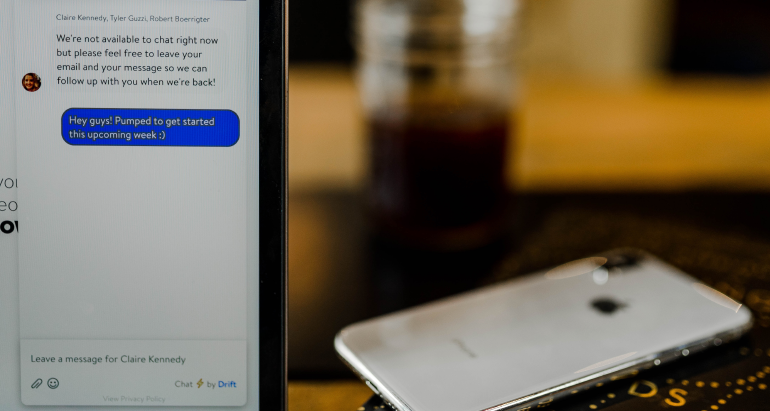
Why You Should Start Using Conversational Marketing
By Lindsay Valenty -
As messaging technologies continue to grow and evolve, one thing has become crystal clear to marketers: customers expect engagement to happen how & when they want it.
Live chat is excellent in the sense that it allows for an instant response—the conversation starts right after the customer inputs their information. This sort of engagement is the cornerstone of conversational marketing.
Conversational marketing falls under the broader umbrella of inbound marketing and should be a pivotal part of your marketing strategy in 2020.
According to a study by Aspect Software, 65% of consumers feel a sense of accomplishment with themselves and the company they are engaging with when they're able to resolve an issue without talking to a live person. 61% think that chatbots can give them faster answers, which increases their overall sense of satisfaction.
So, how can chatbots help your organization? A few ways include:
• FAQs or existing customer-specific questions
• Schedule meetings
• Gather feedback
• Promote events, content, and/or products
Let's discuss how you can effectively implement live chat as part of your conversational marketing plan.
Customer-Time Doesn't Mean Business Time
Conversations can happen at any time, and not all fall in the typical 9-5 time slot of a traditional workday. The fact of the matter is that consumers who use their phones as their primary internet device prefer message-based interactions, which makes chatbots and live chats a great option.
Having the ability to use a live chatbot offers a sense of convenience for your consumers, which leads to our next point.
Conversations Don't Exist In a Vacuum
One of the reasons that chatbots work is that they answer a variety of frequently asked questions. The data collected from these interactions allow businesses to learn what areas they could improve in, and also offers additional insights into how their customers utilize their services.
Compiling and expanding upon this information allows companies to create smarter chatbots that can continue to provide customer support in place of, or in addition to, a live human, as well as identify opportunities for cross and up-selling down the road.
Context Clues are Key to Successful Conversations
Conversational marketing is a great way to drive lead generation by offering a way for people to get in touch with you for support. It also opens your company up to new audiences and different channels, which is why your strategy should utilize a CRM system.
By tying your CRM with your chatbot platform, you're able to pull from existing data to offer your customer better user experiences. They want to be able to have their questions answered as quickly and efficiently as possible, and by not having to repeat themselves over and over again, it not only shows that you RECOGNIZE them but that you CARE about them as well.
Channels May Change, Conversations Stay the Same
Each business is going to have a slightly different conversational marketing game plan. It all depends on which platform or channel your audience chooses to engage with you.
If your consumers primarily engage with you on Facebook, then Messenger is probably going to be the platform that you use. If the bulk of your engagement happens on your website, then utilizing a third-party service makes a lot of sense. Regardless of the channel, keep the below concepts in mind.
Personalize Your Message
Conversations with your customers need personalization with the relevant data you've already gathered from them (such as with an integrated CRM system).
Context is King
Knowing the right information upfront is necessary for the end user's experience, as well as to help you answer their questions correctly in the best way possible.
Don't Be Afraid to Standardize
Although personalization is essential, you don't need to create new content for every interaction. Some aspects of your conversation will be standard, so you should continue to grow and nurture those messages to project a level of professionalism and consistency with all your interactions.
Be Human (Even if You're Not)
The majority of the time, when someone starts a live chat conversation, it's because they're looking for a solution to a problem. By incorporating empathetic language into your chatbots, it helps your customers feel valued and heard.
Learn From Your Experiences
As we stated earlier, you should always be learning from every chatbot conversation that takes place. You should optimize the data you've collected on an ongoing basis to ensure that your consumers are getting the feedback they're looking for just as they would from a real, one-on-one conversation.
Now that you have a better understanding of conversational marketing and its benefits for your business, how do you envision using it?